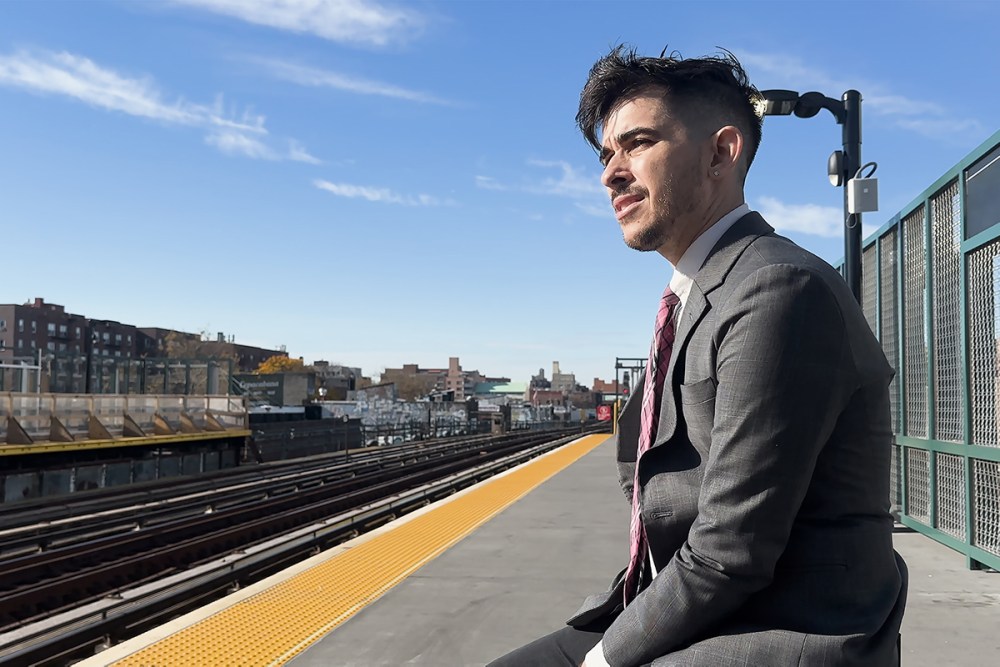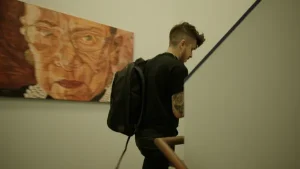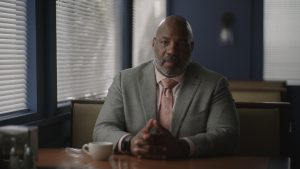A Conversation with Sam Feder (HEIGHTENED SCRUTINY)

In 2021, zero states banned transgender health care for adolescents. Now in 2024, 24 states ban lifesaving transgender healthcare for adolescents. What happened? Prominent medical experts and organizations, including the American Medical Association, the American Psychiatric Association, and the American Academy of Pediatrics, oppose these restrictions. These limitations have compelled numerous families nationwide to travel extensively to secure necessary medical care for their children or witness their suffering without access to appropriate treatment.
One such law, enacted in Tennessee, became linked with others by the Sixth Circuit Court of Appeals and has reached the US Supreme Court as U.S. v. Skrmetti. Arguing for the plaintiffs, the ACLU, and the United States Government [i.e. the Biden administration] on December 4, 2024, Chase Strangio became the first known transgender person to make oral arguments before the Supreme Court.
The issue in Skrmetti [the Tennessee Attorney General] pertains to whether Tennessee’s legislation prohibiting gender-affirming hormone therapies for transgender minors breaches the Equal Protection Clause of the US Constitution. Tennessee’s prohibition, akin to other similar laws enacted by politicians in recent years, allows these same hormone treatments when administered in a manner that aligns with the sex assigned at birth. For instance, under this law, a physician could prescribe estrogen to a cisgender teenage girl for any clinical condition but would be prohibited from doing so for a transgender girl diagnosed with gender dysphoria.
“Heightened scrutiny” is a legal standard used by courts to evaluate the constitutionality of laws or government actions that classify individuals based on certain characteristics, such as gender or sexual orientation. This standard requires that the government demonstrate an important interest that is substantially related to the law or action in question, thus ensuring a more rigorous examination than the rational basis test.
However, for Director Sam Feder (Disclosure), “Heightened Scrutiny” is also the amount of attention the trans community has received from the media over the last four year, far outpacing the 1% of the population we represent. ‘Rampant Transgenderism’ – which I assure is not a thing – has been targeted by the Trump Campaign and now Administration as public enemy number 1 or 2 depending on the day, trading places with gangs of illegal immigrants. If 6 out of 10 Americans do not personally know someone transgender [according to the Pew Research Center, 2021], then the basis on which they form their opinions, make political decisions and develop prejudices comes from media coverage, which is often biased, misinformed, and intentionally misleading.
The danger of the news media shaping conversation about trans people is that it is, at its core, often at the expense of the trans community. The modern media structure is based around clicks. Stories about everyone getting along do not drive readers. Another misguided influence is artificial neutrality, or the need for the perception of balance. Journalists frequently ‘balance’ pro-trans science and sentiments against something contrived from right-wing anti-trans activists, even when both ideas are not equal in size of support or intellectual merit.
It is into this battlefield that Sam Feder releases his new documentary, Heightened Scrutiny, which premiered at Sundance on January 25, a mere 52 days after Chase Strangio argued before the Supreme Court. In this age when news moves faster than ever before, media must move just as fast. In fact, sixty minutes before I hop on a zoom interview with Sam, Trump signs another Executive Order, this time a national under 19 trans health care ban (under 19!).
Hammer to Nail: So I rarely get to ask a question like this, but have you seen the news of the last hour?
Sam Feder: No.
Hammer to Nail: [Trump] just put out an executive order in the last hour basically attempting to ban all hormonal care for anybody under the age of 19 in the entire country.
Sam Feder: I don’t expect that’s going to be the last. I think there’s going to be more and more and more.
Hammer to Nail: Yeah. It just gives us more things to fight, I guess. I don’t know. Did you feel like that this was what it was going to be the first week?
Sam Feder: Yeah.
Hammer to Nail: Yeah. I mean, I’m in Canada, so that should tell you how I felt about it. I left.
Sam Feder: When did you leave?
Hammer to Nail: I was here on January 6th, because I was like, “As soon as they take over the legislature, I don’t know what’s going to happen.”
Sam Feder: I’m happy for you. I really am. I think that was really smart.
Hammer to Nail: Well, first, I want to say, this is a really important film. I’ve said to many people that Disclosure was probably the most important film made for me in the last several years, and somehow it feels like you’ve made something even more important and more timely. So thank you for that.
Sam Feder: That’s nice to say. Thank you.
Hammer to Nail: It is really wonderful to have your voice and your advocacy at the forefront for the Trans community. At what point in time did you know that this was going to be your next project after Disclosure, and how did you start on it?
Sam Feder: Okay, so here’s the story. I was pursuing more scripted projects after Disclosure because making a documentary is really hard and it’s heartbreaking. I think filmmaking in general is heartbreaking for everybody, but we do it anyway. But it was really hard on all the levels. I was so tapped out, so exhausted, I felt I wanted to practice a different creative muscle, blah, blah, blah, and I was doing some animation work, I was doing some scripted TV work and some scripted film work, and then the strike happened. And right before the strike happened… So the strike happened in May, but in February I became aware that the New York Times, there were a bunch of contributors who put out this open letter pointing out the bias in the New York Times.
Hammer to Nail: Yes, in the film you explain this has everything to do with the framing of the articles. Over one 12 month time period, one of the interviewees in Heighten Scrutiny points out, New York Times had more front page coverage that covered the trans movement as a threat to others than they had coverage about trans people being threatened by this political movement. In this way the news media is actually setting the national discourse against us. And then, as Chase Strangio points out in the film, judges and legislatures cite these exact New York Times articles to uphold their own ideas. The coverage of the political right becomes the weapon of the political threat.

A still from HEIGHTENED SCRUTINY
Sam Feder: And then at the same time, I started seeing that clip of Michael Knowles from The Daily Wire, where he says, “Transgenderism must be eradicated from public life entirely.” And what really struck me when I saw that clip was the way that the camera panned across the audience, and you see this in Heighten Scrutiny, when it pans across the audience and everyone’s clapping. And that just got to me in a way that nothing had really gotten in before, and I became scared. I really felt it in my body. And then the people I was working with who came to me to work with me because of Disclosure, started confiding in me about their doubts about trans young people like, “They don’t really know. How could they know? They don’t really know. And is it really safe?” And is all these things that we were seeing the right wing say, like it’s a trend, the contagion, all this stuff.
Hammer to Nail: Unbelievable.
Sam Feder: And I started to realize that we’re losing our allies. Why are we losing our allies? And it’s because they’re reading about this in mainstream press, New York Times, LA Times, Chicago Tribune, The Washington Post, the Atlantic. And so I am a media person. I do think of myself as a media critic first and foremost. And so that’s what I wanted to do. I wanted to document that. I wanted to point out to people how they had been misled, how they had been taught to think of trans people as an ideology rather than an identity. And once something is an ideology, then it’s up for debate. And I was hoping at the time to figure out the how and the why of that, and then I kind of ultimately realized that was sort of futile and futile, and that I really just wanted to get the allies back. It was less about blame and more about exposing to people that they had been misled, and if they think there are allies, they need to come back over to understanding and not questioning us.
So that was the initial motivation. And so I started doing that research during the strike, during the WGA strike, and then did the set of interviews that you see in the film, and that was in March 2024. And I wanted to find a story that would really ground these issues in real life. So then it was a couple months later, the end of June that it was announced that Chase [Strangio] would be arguing at the Supreme Court, and so he’d be arguing this landmark historic case, as the first out-trans lawyer to be arguing at the Supreme Court, it just felt that it really needed to be documented, it really needed to be part of a story, and that it was the perfect story to show the consequences of the media that I had been looking at the past eight months.
Hammer to Nail: I thought it was very interesting what you chose to focus on, because we have spent a lot of time with Chase and we’re understanding this case that is going through the courts but we’re not spending a whole lot of time breaking down the ins and outs of that particular case. We don’t have a sit-down interview with any matter of the family, and we’re just seeing that in live footage. And I really liked that, but I wanted to know a little bit about that decision and if you talked to the family about it, because what it did for me is it made it more universal.
Sam Feder: We didn’t include the family because they wanted their privacy. It was certainly something we asked at first, and then that was it. I’m not interested in pushing anyone to do something they don’t want to do. In terms of the case, we had to be really careful with what we… We had to even be careful with what we filmed Chase talking about, because he said the footage could be subpoenaed, and if anything that he shared about the case got to the other side, that could jeopardize things. But I think we shared enough about what the stakes were, what the case was about, and connecting the dots with how the briefs were mirroring the media, and then the questions that the judges asked on December 4th mirrored the briefs and the media.
Hammer to Nail: In addition, it tugs at our hearts with the family. We’re kind of seeing them stuck in the whirlwind of this, the circus, and they don’t even have time to sit down and have a moment to talk. I mean, the reality is nobody lets us talk.
Sam Feder: Yeah, nobody lets us talk…just showing that ecosystem was more of my goal. The case, I think it’s not a complicated case. It’s not complicated. I also think in terms of trans subjectivity, I really resist the victim narrative. I think yes, we are oppressed and there are a lot of oppressed people in the world, there’s a lot of marginalized people in the world, but a lot of the stories about oppressed and marginalized people are about pity, and I feel like audiences really kind of lean into ‘it feels good to feel bad,’ and then they think they’ve done their work.
Hammer to Nail: This is you calling on our allies to get back to work.
Sam Feder: If they cry for us, they feel like they’re on our side, and I don’t think that’s enough. And so I am always interested in centering trans voices and giving them complete agency and allow them to be the experts of their own lives, and not positioning them in a place where they have to defend themselves. And so a lot of the decisions were made around ‘what is my responsibility as a filmmaker,’ as a trans person, and how I want to tell a story about trans communities.

A still from HEIGHTENED SCRUTINY
Hammer to Nail: Yeah. When you were sitting down with people in March, before you knew that the case was going to come up, I guess, how did those conversations go? What were you wanting to talk about when you’re still kind of in a nebulous stage of, “I want to have a discussion, but I’m not exactly sure the direction of the film?”
Sam Feder: I was looking at the swath of coverage from sports to healthcare, to employment, to housing, just all of all the ways in which we were being, I don’t know, what’s the word, constructed, our lives were being constructed in the mainstream press. I was looking at understanding sort of journalistic standards so that one takeaway just could be that people would have a more critical eye of mainstream press in general. I was asking the whys and the hows of how we got to this moment, and I always, especially with the trans journalists, also just want to document their career, right? No matter how well-known they are, it is phenomenal that they’re writing about their communities and they’re pushing ahead in an industry that is not welcoming at all. So I really wanted to give them the time and the space to share.
Hammer to Nail: It’s nice to see people being able to talk for themselves instead of having experts come in who aren’t of the community and are looking at it from the outside and claiming to be experts. That can be very frustrating.
Sam Feder: And it’s completely othering and it’s patronizing, and it just makes no sense. I mean, who’s a better expert of their life than themselves, right?
Hammer to Nail: Yeah. I am wondering at a certain point you realize, “Okay. Well, I’m going to finish the film before we know how the Supreme Court case ends.” Does that change what you decide to film or how you decide to structure it, or is there always the intention that there’s going to be another… Is there going to be another mini-act after this comes out? I mean, I’m really hoping we get a very happy epilogue in June?
Sam Feder: As soon as that question kind of came up, I felt like the film didn’t need that. That ending on the argument would be really strong and really important, and the impact of the film in real time is kind of more important to me right now than anything else. I wanted the film to be out while the judges were deliberating. If we end up with a distributor who wants to give us the budget to film the opinion that gets released by June. Absolutely. I think that’d be wonderful. And then to interview Chase again and see how he reacts and include Mila and some of the journalists. Yeah, that’d be beautiful, but I don’t think the film needs it.
Hammer to Nail: Mila has one of the best moments in the film when you’re at the PTA meeting and all the school board members are on their phone, and Mila shouts out, “I learned how to be respectful in kindergarten.” Oh my God, to be able to just cut through the bullshit when you’re that old and you don’t know that you’re not supposed to do that, but they should also know better.
Sam Feder: The cruelty in that room that day, it took me weeks to shake that off. I mean, the camera pans from the speaker to the board, that was absolutely real. That was in real time. It was just unbelievable the ability to ignore someone standing right in front of you who’s just sharing their experience. It was so confounding.
Hammer to Nail: And honestly, they’re not doing their jobs when they’re doing that. It’s their job as school board members to listen. That’s what they’re there for.
Sam Feder: Yeah, and they think their job is to get rid of masks and to get rid of books and to ban trans people from participating in everything. So it would be nice. I wish they knew what their job was. That would be nice.
Hammer to Nail: I think this is the first film that I’ve watched that I saw people grieve for the election, and I was curious going into it, wondering how you were going to deal with that. I mean, the brakes just slam for everybody, which I think is how we all felt. Can you talk a little bit about the decision to let that live in the moment almost in real time?

A still from HEIGHTENED SCRUTINY
Sam Feder: Yeah. I mean, the election was always the backdrop of the film. Just from when would the date of the argument be set? Was it going to be set before inauguration or after. It was always on Chase’s mind. It was always impacting his preparation and his argument. And gosh, of course I didn’t know what the footage would be that we would get of the day, what his reaction would be, but it was crucial. Chase is a private person, and again, when it comes to trans storytelling, I’m not interested in showing the audience this sort of prurient things they want to know about trans people. And Chase is really private, and I didn’t know what angle we would go into it. I assume we’d go more into how’s this going to affect the case? But like you said, we were all just so raw and everything stopped, and I remember I didn’t want to get out of bed that morning because I didn’t want to confirm. I didn’t want confirmation because I went to bed before it ended just.
Hammer to Nail: Yeah I stayed up all night because I like pain.
Sam Feder: So when I saw that footage of Chase and his vulnerability and his pain, it just felt so grounding, and that line where he says, “What do you do when you don’t understand the world you live in?” He talks about the loneliness that he’s feeling, and then he is like, “Everyone is probably feeling the loneliness,” and I just think that it’s so important for people to hear that. And it was crushing. It’s crushing. It’s still crushing, and there’s no silver lining.
Hammer to Nail: I think it’s one of the things that’s nice about the film ending where it does. In our mind, we can decide that it’s going to be a good ending. I’m terrified that it’s not. I’m terrified that this court is… I just don’t respect them to come up with a decision on legal grounds. Like that school board, I don’t trust them to do their jobs.
Sam Feder: I’m not in the position to really talk about the legality of the case, the impacts of the case, the decision of the case, but I’m preparing for the worst as an individual, and what I’m challenging myself to do is to literally get to know the people I live next door in my building. I get to know the people who live in the building beyond that, because I really think that’s what it’s going to come down. Local care, locally supporting each other beyond our comfort zones, maybe beyond political lines. Just what does your neighbor need? Do they need a cup of soup today? Do they need help getting their groceries? Do they live alone? And also, I’m a single person living alone. I want my neighbors to know me too, and I think that’s just what I’m looking for.
When we got on this call, and you asked if I had seen the headline, I’m just like, “I can’t follow this in real time. I don’t want to follow this in time.” I just need to think about what do I need to do to take care of the people I love and the community around me. So I feel like that’s the only position of power we have right now.
Hammer to Nail: I feel like part of me coming to Canada was so that I wouldn’t be following it in real time, but now I feel like I’m doing it just so I can understand what everybody else is going through because I feel so privileged that I was able to leave. Obviously, he’s been very busy, but I hope Chase has had a moment to realize how important what he did is, that he got to argue in front of the Supreme Court, and he represented us so well. Has he had a chance to reflect on that and at least take a moment to celebrate himself?
Sam Feder: I mean, as soon as the argument was over, they had to start preparing for the inauguration. So the work is endless for the lawyers at the ACLU. It’s endless for Chase. It’s endless right now for all trans lawyers and any trans advocate. So I mean, I know he had to go back to work right away. Besides that, you’d have to ask him.
Hammer to Nail: Yeah. I mean I hope I can. I hope I can tell him when I see him someday, that I’m very proud of him and I’m very proud of you, Sam.
Sam Feder: That’s nice to say. Thank you.
Hammer to Nail: Thank you so much for making this film and for all you do for our community. Thank you for talking to me today.
Sam Feder: Thank you. I’m really glad you wanted to.
– Bears Rebecca Fonté











